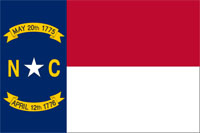NC approves constitutional ban: 61 to 39
 For those in the LGBT community who have watched state after state pass constitutional amendments to ban same-sex marriage, the results in North Carolina were expected: Voters approved the ban by a margin of roughly 61 percent to 39 percent, as of late Tuesday night.
For those in the LGBT community who have watched state after state pass constitutional amendments to ban same-sex marriage, the results in North Carolina were expected: Voters approved the ban by a margin of roughly 61 percent to 39 percent, as of late Tuesday night.
Passage makes North Carolina the 31st state to pass a state constitutional amendment to block legal recognition of same-sex marriage. And North Carolina’s ban goes even farther—banning recognition for any relationship other than a male-female marriage.
Local papers reported record turnouts for the vote Tuesday, even though some had anticipated a lighter turnout due to the lack of a contest in the Republican presidential primary vote.
But interest was apparently high—spurred in part, perhaps, by robo-calls from former President Clinton (against the amendment) and other advertisements from the Rev. Billy Graham (for it). The Obama campaign issued a statement in March, saying, “While the President does not weigh in on every single ballot measure in every state, the record is clear that the President has long opposed divisive and discriminatory efforts to deny rights and benefits to same sex couples. That’s what the North Carolina ballot initiative would do—it would single out and discriminate against committed gay and lesbian couples—and that’s why the President does not support it.”
Also lining up against the amendment were the state’s governor, the state NAACP, U.S. Senator Kay Hagan (D-NC), and many of the state’s big city mayors.
One of the state’s most popular native sons, Rev. Billy Graham, 93, issued a statement in support of Amendment One that appeared in many of the state’s daily newspapers Sunday. Graham said, “The Bible is clear—God’s definition of marriage is between a man and a woman. I want to urge my fellow North Carolinians to vote for the marriage amendment.”
In a television ad, Mark Creech, executive director of the Christian Action League of North Carolina, told viewers that Amendment One “is an unprecedented opportunity for the church to bring the will of god, the righteousness of god, the teachings of scripture to bear on the political process.”
Amendment One was on the ballot Tuesday by virtue of approval by the state legislature last September.
The latest campaign finance reports available through the state elections division showed the anti-gay National Organization for Marriage had contributed more than $100,000 for Amendment One support by the end of March. But the News Observer of Raleigh-Durham said the organization contributed more than $400,000 by the end of the campaign. The paper said the Human Rights Campaign “and its affiliates” had contributed $500,000 to defeat the measure.
An election finance report filed by the Vote for Marriage coalition pushing the initiative showed it raised $1.2 million by April 30. The Coalition to Protect NC Families raised $2 million by April 30, according to state records.
HRC tried to look at the bright side of Tuesday’s numbers, noting that, in 2004, similar ballot measures passed by margins of 71 percent to 29 percent, and noted that the average for southern states has been 75 percent to 25 percent.
As late as April 24, Public Policy Polling reported that momentum was turning against Amendment One. The poll, taken April 20 to 22, showed 54 percent said they would vote for the ban while 40 percent said they would vote against. Six percent said they were unsure. When PPP first polled on Amendment One, in October 2011, 61 percent of respondents said they would vote for it, 34 percent against.
Polls in Minnesota, where a similar constitutional ban will be on the ballot in November, currently show a much closer contest. A PPP poll in January showed 48 percent for and 44 percent against, with eight percent unsure.
A PPP poll in Maine, where a pro-active measure seeking to establish a statutory law allowing same-sex couples to marry, reported that 54 percent of respondents were in favor of allowing gays to marry and 41 percent opposed, as of March.
Opponents of a same-sex marriage law passed in February by the Maryland legislature have until June 30 to collect more than 55,000 signatures. And opponents of a newly passed marriage equality law in Washington State have until June 6 to turn in more than 121,000 signatures to put Referendum 74 on the ballot there, seeking to prevent the new law from taking effect.
On the ballot, Amendment One stated: “Marriage between one man and one woman is the only domestic legal union that shall be valid or recognized in this state.”
A second sentence, which did not appear on the ballot, stated “This section does not prohibit a private party from entering into contracts with another private party; nor does this section prohibit courts from adjudicating the rights of private parties pursuant to such contracts.”
According to the Independent Weekly newspaper of Chapel Hill, many voters did not understand that Amendment One will affect heterosexual couples, as well as same-sex ones.
“Local governments, including those in Durham and Orange counties, would be forced to drop health insurance and other benefits now offered to the domestic partners of unmarried employees, gay or straight. Other local governments would be precluded from offering these benefits.”
Jeremy Kennedy, campaign manager for Protect All NC Families, issued a statement late Tuesday night saying the group was, naturally, “disappointed” in the results but vowed “our fight for fairness is not over.”
“This fight was about more than marriage,” said Kennedy. “Amendment One was overreaching and will have unintended consequences for families, children, women, and seniors in North Carolina. We will continue to work with our partners across the state to ensure fairness, equality, and common sense prevail.”


Leave a Reply